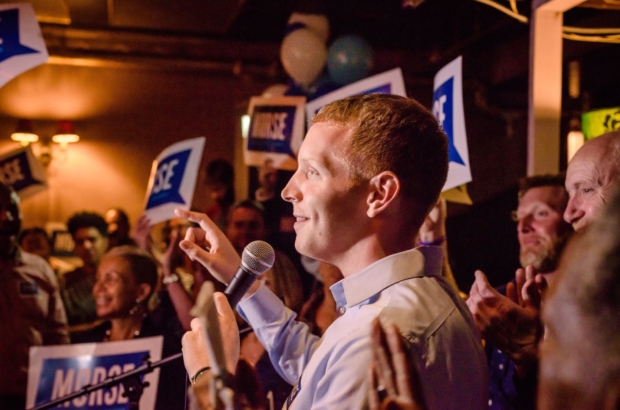ALEX MORSE, the 30-year-old mayor of Holyoke, may look like he’s on a fool’s errand by challenging Rep. Richard Neal in next year’s Democratic primary. After all, just seven months ago Neal’s three decades of toil in the DC vineyards landed him in one of the most powerful positions in the House, chairman of the tax-writing Ways and Means Committee. But Morse says the veteran Springfield pol is out of step with the urgency of the times, and he questions whether Neal’s new clout will deliver tangible gains for the First Congressional District.
“I think there’s an urgency to this moment right now in our country,” Morse says in this week’s Codcast. “These aren’t normal times. It isn’t business as usual. And that urgency isn’t matched by our current representative in Congress.”
Defeating an incumbent eight years ago to become Holyoke’s youngest mayor ever at age 22 — as well as its first openly gay leader — Morse’s path has not been carved by following the wait-your-turn custom. What’s more, there’s plenty of recent precedent for voters tossing out powerful pols in Democratic primaries. Last year, Ayanna Pressley upended 10-term incumbent Michael Capuano, who was poised to take over as chair of an important transportation subcommittee. And Alexandria Ocasio-Cortez ousted a New York incumbent who was widely seen as a potential heir to the House speaker’s post.
But Morse unquestionably starts out as a huge underdog against a well-funded incumbent who’s likely to make the case that his decades in office are about to pay particularly big dividends for Western Massachusetts.
Morse told Mother Jones magazine that he’d “be thrilled to be welcomed into the Squad,” a reference to the foursome of progressive first-term congresswomen making waves in Washington, which includes Pressley and Ocasio-Cortez. He’s tapping Pressley’s campaign staff for talent as he ramps up his effort, and says he’s looking to replicate the approach of his own 2011 mayoral victory and the winning Pressley and AOC campaigns by expanding the universe of usual voters in congressional primaries.
“There are tens of thousands of people who have already taken the time to register to vote,” says Morse. “They are interested in being part of the democracy here, but just aren’t showing up in congressional primaries here in Western Mass. So our path is in expanding the universe, reaching out to people who have felt left behind.”
Morse’s critique of Neal includes attacking his reluctance to call hearings on Medicare-for-all proposals and the fact that he’s the only one in the state’s nine-member House delegation who has not signed on to the Green New Deal. On the most prominent issue he’s faced since taking his powerful committee chairmanship in January, Neal has been accused by progressives of “slow-walking” the process of seeking President Trump’s tax returns, something he waited until April to begin.
“This one issue is certainly not the reason I’m running for Congress,” Morse says of the Trump tax returns. “But this issue is again another example of our congressman’s lack of awareness of the urgency of this moment.”
Morse is poised to paint Neal as a Washington insider who’s more beholden to big corporate donors than the needs of residents of economically distressed cities in his district like Holyoke and Springfield. He questioned how Neal can fight the opioid epidemic or champion health care expansion when he’s banking campaign donations from the pharmaceutical industry.
“He has power. No one is arguing with that. But power for who?” asks Morse. “He knows how Washington works — he’s been there a long time. But he certainly won’t change how Washington works. Because Washington’s working for the wealthy, the well-connected.”
In terms of early reaction to Morse’s July 22 announcement, a Berkshire Eagle editorial struck a wait-and-see stance, welcoming the challenge and the “good, issue-oriented race” it should bring. But there was nothing nuanced in the view quickly staked out by the Springfield Republican. “Morse’s challenge to Neal comes at the worst possible time,” was the headline on a Republican editorial last Thursday, the day I spoke with Morse for the Codcast.
As Democrats push their party further to the left, the editorial said, Neal is now considered a moderate. “In other words, he’s willing to work with other Democrats and Republicans to get things done,” said the paper. “The bitter irony is that his best strength is being portrayed as a weakness, at just the time our leadership needs more result-driven members, not fewer.”
Morse dismisses the idea that the race will be decided by editorial boards and other opinion pooh-bahs, and he rejects the idea that the district would be losing a potent force given Neal’s new powerful role. “As mayor, I haven’t felt like we’ve had a strong partner or champion in Washington helping us advance our goals,” he says of Neal.
Morse seems very much on course to reprise some version of Pressley’s “change can’t wait” campaign theme. Whether it will find the same resonance across the 87 cities and towns of the First Congressional District is now the question.
